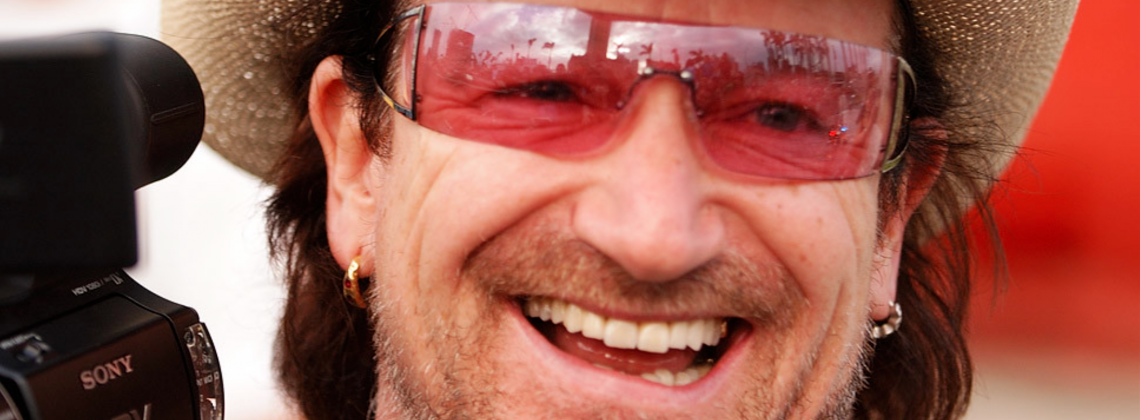

If Bono is a picture of our moment, he’s also used his faith to shape it
Surrender: 40 Songs, One Story by Bono. Knopf, 2022. 576 pp., $34
Bono’s raw talent as the lead singer, primary songwriter, and front man for U2 over its forty-five years of existence is pretty much undeniable; his talent for striking much of his band’s audience as pretentious and annoying is, too. Bono’s famous, self-conscious rant “Am I bugging you? I don’t mean to bug ya,” captured in the 1988 documentary Rattle and Hum, shows that his reputation was already becoming part of his shtick by the time the band was barely a decade old, and it has only grown since. Like him or hate him, acknowledging Bono’s enormous accomplishments, both as a musician and as a social activist—accomplishments that were celebrated when U2 received the Kennedy Center Honors this year (the ceremony took place on December 4 and will be broadcast on December 28)—means accepting him for what he is. But who, exactly, is he?
Millions of words, both of praise and criticism, have been written about U2’s music and Bono’s leadership in efforts to fight poverty and promote development around the world; Bono’s own memoir, Surrender: 40 Songs, One Story, now adds to it. It’s a charming, revealing, and—in my opinion—only occasionally annoying book. Bono is skilled with words, and he relates with real thoughtfulness and often funny self-deprecation dozens of stories about his childhood, the formation of U2, his courtship of his wife Alison, and the ups and downs of songwriting, touring, recording, and making artistic and business choices (and sometimes regretting them) as the band became more and more successful. His sketches of the rich, the famous, and the notorious whom he, his family, and his band have encountered along the way are a particular delight (even when they border on the glad-handing: Aside from Vladimir Putin and Donald Trump—and maybe, just maybe, Prince—he has nice things to say about pretty much everyone who gets a mention in the book). While his turns to introspection as he struggles with his own health, mortality, and memories do eventually weigh down the text’s lyricism towards the end, mostly the result is a fascinating and even poetic survey of the life of a man whose restless, searching, passionate mind is constantly pushing him onward. In what direction? Simply put, towards God.
In an early chapter, while relating his pre-U2 memories of attending a “Holy Roller” church with a teen-age friend in Dublin in the mid-1970s, Bono writes:
[L]istening to the speakers at these meetings, I was . . . attracted to the God of the scriptures that they read from. I wasn’t sure I’d ever encountered such a presence in our lovely little Church of Ireland in St. Canice’s [Bono’s mother was a Protestant, his father was Catholic; as children, he and his brother attended Protestant services with their mother] . . .I did have a sense of the divine, but it was inchoate and formless, so when I started to uncover clues about the nature of this presence, I was fascinated. The Bible held me rapt. The words stepped off the page and followed me home . . . .
I’d always be first up when there was an altar call, the “come to Jesus” moment. I still am. If I was in a café right now and someone said “Stand up if you’re ready to give your life to Jesus,” I’d be the first on my feet. I took Jesus with me everywhere and I still do. I’ve never left Jesus out of the most banal or profane actions of my life.
This isn’t a surprising revelation; the deep Christian piety, however heterodox, that has characterized so many of the songs Bono has written is hard to miss. Still, Bono’s Christianity and his orientation towards the divine are an interpretive key many misunderstand, particularly when it comes to his activism. In a lengthy interview published in The New York Times Magazine on the occasion of Surrender’s release, Bono’s religious motivations are never mentioned. This is unfortunate, because inquiring into the connection between Bono’s faith and the way he has approached social activism tells us something about that faith and its social manifestations, and in a manner very relevant to our political moment.
Central to that connection is Bono’s contempt for organized religion, and by extension almost any kind of institutionalized expression of an exclusionary ideological or moral or metaphysical claim. “Bloody Sunday” of January 30, 1972 inspired not only one of U2’s most iconic songs but also grounded Bono’s rejection of both Catholicism and Protestantism, both nationalism and sectarianism. It’s not hard to see the connection between his dismissal of organized Christianity (“Was there any evidence Jesus even wanted a church?”) and his dismissal of his fellow citizens who attempted to draft U2 into taking a side in “The Troubles” of Northern Ireland. But if Bono’s deeply universalist Christian beliefs force him away from fully embracing any particularizing creed or community, to what does he acknowledge belonging, if anything?
His struggle to articulate his own desires and doubts regarding how, and how much, and in what way he belongs to his wife and children, to his extended family and its complicated history, and most of all to his fellow band members, is a consistent theme throughout Surrender. But that kind of belonging has no obvious social component to it. Instead, the belonging that has led him to feel enlisted in fights against global poverty is purely scriptural: As a believer, he cannot avoid the fact that “the poorest people are at the heart of Christianity,” and that “only once does Jesus speak about judgment, and when he does, it’s about how we treat the poor” (at which point he quotes Matthew 25:44-45).
The vocational connection to humanitarian service to which many hundreds of millions have over the centuries felt called is one of the greatest witnesses of Christianity, and Bono’s indefatigable involvement in raising enormous funds for African countries—and convincing governments to forgive even more enormous debts weighing upon them—is a tremendous example of such. But in being passionately, scripturally, connected to the acts of service themselves, and not to any community necessarily grounded in either providing, benefitting from, or even just understanding and adjudicating the impact of that service, leads to, given the history of liberalism, some perhaps predictable places.
As one who relishes an argument, Bono often leans into his sometimes crudely transactional and blandly individualistic liberal humanitarianism. He defends, despite the contention it causes, his friendships with billionaires and world leaders; defends his monomaniacal focus on international development and whatever donors or developments, regardless of politics, might enable it to happen faster; defends the practical results of his work. That Bono sees no essential conflict between his rootless, devout Christian humanitarianism and the complicated, often perverse realities of technological expansion and financial globalization is clear, the positive language he uses to describe the transformative power of tax competitiveness and capital flows being just one example. Ireland, a “small rock in the North Atlantic,” doubled-down on attracting businesses focused on pharmaceuticals and computer technology, turning—wonderfully, in his writing—“the land of saints and scholars” into “the land of sinners and software engineers, our once-light industry now entirely weightless.” And as for the United States (which seems to dwell in Bono’s mind as the embodiment ,at least potentially, of, in Jesus’s words, “the light of the world”), its “entrepreneurial capitalism” is just part of the story. More than a nation-state, America is the manifestation of a non-specific creed of life, liberty, and the pursuit of happiness, a “poetic idea in which we all have a stake” and “the greatest song the world has not yet heard.”
But despite all this Christian neoliberalism, it can’t be denied that Bono also documents with real honesty his struggles with the limitations inherent in this globalist vision, building upon an earnest desire to come to a better understanding of what the best possible application of his Christian calling involves. He details the efforts he and others in the development community have taken over the decades to move from a charity-mindset to a justice-oriented one, to confront what he (along with many others, particularly a new generation of African activists and thinkers who have pushed-back against Bono’s defense of globalization) calls White Messiah Syndrome. “I still believe aid is essential, but how it is decided upon and delivered is just as important as the money itself, as is listening to the people it is designed to support,” he concludes. (In his interview with The New York Times Magazine Bono, though still defending the empowering force that is capitalist development, acknowledges that he’s been so focused on the massive inequality between developed countries and undeveloped ones that he’s not paid much attention to the growing inequality within those countries themselves.) In one of Surrender’s most insightful paragraphs, he writes:
I have often regretted that we didn’t stop to think a little more carefully about what right we had to take on this work, to barge our way into the corridors of power. We took it for granted that because the problems of global inequality were mostly created by the Northern Hemisphere, it fell to those of us in the north to solve them. I recognize now how arrogant this position was. I learned late the wisdom in a Senegalese proverb, “If you want to cut a man’s hair, be sure he is in the room.”
U2’s music, and Bono’s words, have helped bring light to the rooms of hundreds of millions around the world for decades, and the soft power he has gained from this accomplishment has been, overwhelmingly, used on behalf of a deeply Christian set of humanitarian principles. His universalist articulation of those principles, and especially their cultural implications, are not above criticism, and Bono, musical journeyman and mystical poet though he be, is at least grounded enough to hear those particular criticisms and struggle with them seriously. In the end, Surrender should be understood, at least in part, as a document of that struggle. The New York Times Magazine missed that part of the story; hopefully Bono’s many other readers will not.
Russell Arben Fox runs the History & Politics major and the Honors Program at Friends University, a small Christian liberal arts college in Wichita, KS, where he has lived with his wife and their daughters since 2006. He is a regular contributor to the localist website Front Porch Republic, the Religious Socialism blog sponsored by Democratic Socialists of America, and the Mormon blog By Common Consent.